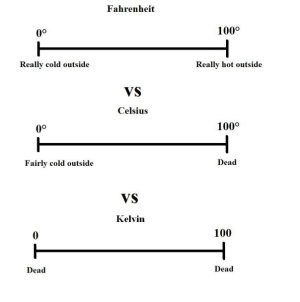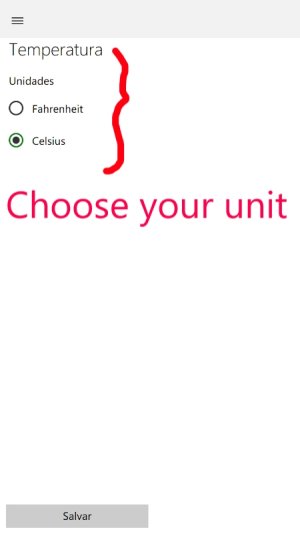N_LaRUE
New member
- Apr 3, 2013
- 28,641
- 0
- 0
Just to point out something... You basically explained why the metric system is more comfortable (ignoring Celsius for the moment). Base 10 system. It makes more sense to people and is easier to work with. Also the metric due to it's nature has a simple small to large structure. Base 12 is more complex. No one likes using fractions.I'll take one more shot at an elaboration. If you still don't get it, I'm out.
Base 10 means very little out of the scientific realm. What matters, in the context that I brought up, is multiples of whole numbers, which are easier to work with. If you're trying to approximate measurements, say for building a house, having whole numbers makes processes significantly easier to remember and visualize, and etc. 12 has multiples of 1, 2, 3, 4, 6, and 12. 10 has multiples 1, 5, and 10. With the imperial system, that's entirely double the chance that your measurements are going to result in a whole, easy to remember, easy to perform mental math on, number. I'm not a mathematician so I cannot explain in simpler or more exact terms how this plays out.
As for temperature, yes, it works because I'm used to it. You're also used to Fahrenheit, though you don't realize it. It's not arbitrary- we deal with numbers similar to Fahrenheit *every* *single* *day* of our lives. Humans like things in scales of 0-100. Humans like things in scales of 0-100 so much they devised an entire imaginary number system that is based around the idea of 0-100, devised a way through which you can convert any number to this system, and gave it a name. We call it: per cent. That's per-100, percent, %. Fahrenheit basically measures the weather by way of 0-100, where those bounds are only exceeded in certain climates at certain times of the year (or during certain extreme weather events). Yes, this means Fahrenheit works better in some climates than in others, but it's a guided system, whereas Celsius is *entirely* arbitrary for weather. The upper bound is 37.777 degrees- it makes sense if you're used to it, yes, but Fahrenheit more closely resembles a much more familiar set of numbers, whereas Celsius is entirely its own thing.
Know that I'm playing devil's advocate here- I do believe these are actual benefits of a few of the imperial system's quirks. I personally use the metric system, but I have the ability to see past my own biases...
As someone above has pointed out Celsius is based on water. From a weather perspective this makes sense. Zero means your likely to have ice. Blow zero you're going to have ice and possible snow. So to me, weather wise, Celsius make a heck of a lot more sense. No one uses decimal places when discussing weather unless your a scientist. We only use whole numbers and possibly 0.5.
I get where your coming from but the scale devised for F was way more arbitrary than C. Zero is when water freezes. That has tangible understanding for most people.
The is no need to hold my hand either. I'm quite capable of understanding concepts. Thanks.
As for playing devils advocate, you didn't explain you position very well at first. If you want to get a person to understand a system they are not use to and supposedly better, you need to explain why. I still don't agree with you but I'll leave it there. To each their own.
Last edited:










